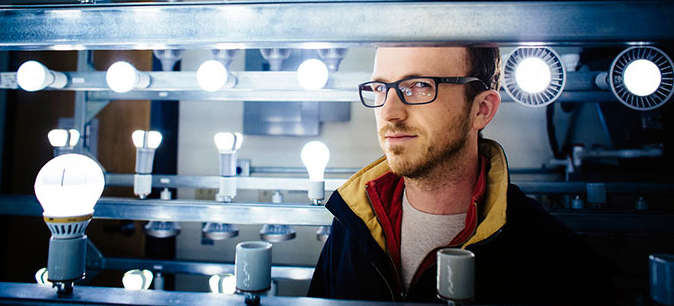New UC projects target greenhouse gas emissions

A deep energy efficiency initiative will develop ways for utilizing new technology across the UC system, such as research from Jordan Alley of the California Lighting Technology Center at UC Davis.
The University of California could improve the energy efficiency of its buildings by as much as 50 percent through one of its new projects designed to accelerate the reduction of greenhouse gas emissions across UC.
UC’s Global Climate Leadership Council has approved 20 research and outreach projects as part of an effort to become the first major university in the country to achieve carbon neutrality.
The projects focus on leveraging faculty expertise and student creativity to improve the energy efficiency of buildings and develop carbon neutral energy supplies. The projects support UC President Janet Napolitano’s Carbon Neutrality Initiative, which commits UC to produce zero-net greenhouse gas emissions by 2025.
“UC is utilizing its best and brightest faculty, students and staff to take on this formidable challenge,” said Nathan Brostrom, UC’s executive vice president, chief financial officer and founding co-chair of the Global Climate Leadership Council. “Our efforts will create model education practices, research strategies and business operations to address global climate disruption.”
In June, Napolitano appointed experts from inside and outside UC to the Global Climate Leadership Council to map a strategy for engaging the entire university to help meet the system’s carbon neutrality and related sustainability goals.
Carbon neutrality had been a long-term goal of UC’s sustainable practices policy, but Napolitano galvanized efforts across the system by setting a 2025 deadline.
The projects being implemented by the Global Climate Leadership Council include:
- Deep energy efficiency: Individual buildings and labs at UC have cut energy use by 50 percent through ultra-efficient lighting, smart-building management systems and other technologies. Researchers working with the UC Office of the President Energy Services Unit will develop a platform to share the latest research and best practices for scaling these efficiency measures across the UC system. The research will devise processes for prioritizing when and where to retrofit buildings and deploy the new technology.
- Research summit: UC will host a conference in fall 2015 with researchers from across the system, state and federal agencies, and private industry. The conference will showcase promising research and technologies in areas that have been identified as priorities for achieving carbon neutrality, such as ramping up the use of biomethane as an alternative to natural gas and deploying smart microgrid and battery storage technologies that integrate renewable energy. The event also will explore strategies for expanding research collaboration and sharing of best practices across UC.
- Faculty climate action champions: UC will establish the award to promote faculty leadership in scholarship and teaching about climate-action solutions. Each campus will select a faculty climate action champion after soliciting proposals from faculty of all disciplines for activities that engage students and provide campus-wide leadership in carbon neutrality and sustainability issues. Faculty champions will receive a small grant to fund their proposals.
- Student fellowships: President Napolitano has created a President’s Sustainability Student Fellowship/Internship Program that will provide $7,500 to each campus, the UC Division of Agriculture and Natural Resources, and Lawrence Berkeley National Laboratory to fund student activities in support of the Carbon Neutrality Initiative. In addition, two Environmental Defense Fund Climate Corps Graduate Student Fellows will work with UCLA and UC San Diego health systems to reduce their energy use.
- Green labs certification: Laboratory buildings are the largest energy consumers in the UC system. For this reason, each UC campus has been developing Green Lab Certification Programs to incentivize and reward researchers to adopt more sustainable practices in their labs. Through energy use audits, equipment replacement and implementing operational best practices, significant energy savings can be achieved through these certification programs. UC Riverside is initiating a study to create a best practice protocol and to measure the effectiveness for a program that can be deployed systemwide.
- Climate education gateway: With a goal to increase climate and sustainability literacy systemwide, an online portal will be developed to enable UC faculty to share educational resources across campuses and disciplines.


